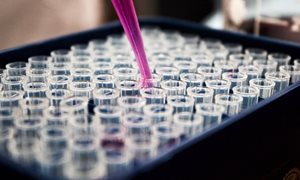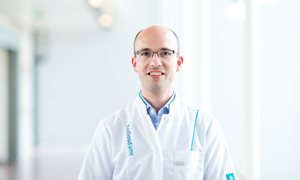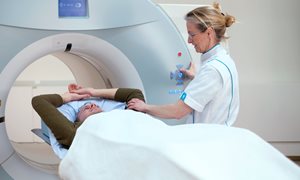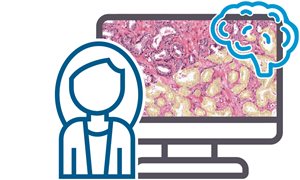-(1).jpg.aspx?width=500&height=333&ext=.jpg&type=BlockColumn1Zoom1)
Quilting reduces complications after a mastectomy or axillary lymph node dissection and offers many benefits to a patient. With this technique, a surgeon closes the cavity under the wound with needle and thread. A drain is no longer necessary. This has been shown by PhD research conducted by Britt Haghuis-Ten Wolde, in a collaboration between Radboud university medical center and Canisius Wilhelmina Hospital (CWZ).
Complications occur in a quarter of all breast cancer operations, with seroma being by far the most common. Seroma is wound fluid that accumulates in a cavity under the wound area. In a collaboration between Radboud university medical center and CWZ, PhD candidate Britt Haghuis-ten Wolde shows that seroma can be prevented by quilting, a suturing technique that closes up the cavity or so called ‘dead space’. Surgeon and co-supervisor Luc Strobbe of the CWZ has been using the technique in breast cancer operations since 2010.
Simple technique
In quilting, the surgeon places absorbable sutures so that the skin is attached to the underlying muscle layer. This brings the layers close together and reduces the risk of fluid formation, subsequent bleeding and inflammation. Haghuis-ten Wolde explains: "The technique has been around for some time and is used for example by plastic surgeons. So this is a simple and familiar technique using only needle and thread, which is remarkable in times of robotic surgery. The technique only takes ten minutes longer during the surgery and a one-time short training of the surgeon."
The researchers show that quilting reduces the risk of the complication seroma in mastectomies and axillary node dissections by a factor of four, leading to major benefits for the patient. "In the case of seroma after surgery, we sometimes have to drain fluids via a puncture every week for a long time. This can be avoided by quilting, reducing the inconvenience of punctures and additional visits to the outpatient clinic. With quilting, also the hospitalization is shorter and we see no readmissions and no additional surgeries. Recovery is quicker and women can proceed faster in the treatment process."
Without a drain
Another advantage of quilting: it makes a drain unnecessary. Surgeons now routinely place a drain to remove wound fluid. But a drain causes pain and is unpleasant. Haghuis-ten Wolde: "We have shown that it is safe to omit the use of the drain. In our studies we even see less seroma in the group without a drain. So the remedy seems worse than the disease." In addition, thanks to quilting, surgery can take place in day treatment. Hospitalization is only necessary because of the drain and the care required for the drain.
Quilting thus offers many advantages in a mastectomy or axillary lymph node dissection. But Haghuis-ten Wolde would rather see as many breast-conserving operations as possible, in which quilting is not an issue. "Women are sometimes afraid and choose a mastectomy. Just to be on the safe side, they think, while we now know that a breast-conserving treatment is at least as good as a mastectomy. I show in my research that an amputation, considering complications, has more risks than a breast-conserving operation. So I recommend on the basis of my thesis to perform breast-conserving surgery as much as possible, if a woman is eligible for it on the basis of the tumor."
Follow-up study
The research team will now further implement and investigate the technique of quilting in a large follow-up study with six participating hospitals. The other hospitals can easily learn the technique, for example via an instructional video or by joining an experienced surgeon. The results of the study are expected in about two years.
More information
On 13 January at 16.30, Britt Haghuis-ten Wolde will defend her dissertation entitled 'Complications following breast cancer surgery; risk factors and prevention' (dissertation available online after 13 January). The live stream can be followed via this link.
-
Want to know more about these subjects? Click on the buttons below for more news.
More information
Annemarie Eek

wetenschapsvoorlichter
Related news items

Arthritis drug use to limit antibiotics in blood cancer Drug Anakinra strengthens gut lining and inhibits inflammation
12 May 2022 Researchers from the University of Adelaide and the Radboud University Medical Center have repurposed an arthritis drug to restrict the use of antibiotics in the treatment of side effects caused by blood cancer, including leukemia, lymphoma and myeloma. go to page
European guideline recommends MRI screening in women with dense breasts
15 March 2022 New recommendation advocates personalized approach in breast cancer screening with more attention for breast characteristics and individual wishes. go to page


